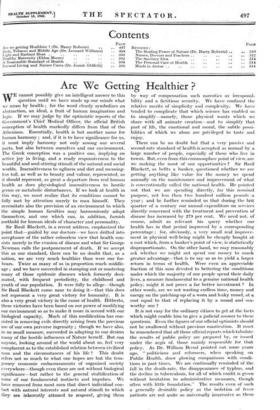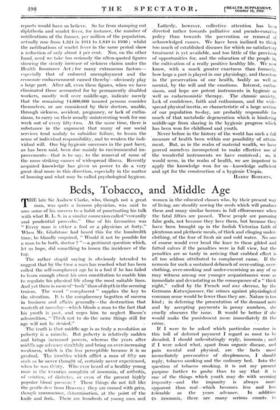Are We Getting Healthier ?
WE cannot possibly give an intelligent answer to this question until we have made up our minds what we mean by health ; for the word clearly symbolizes an abstraction, an ideal, a fruit of human imagination and logic. If we may judge by the optimistic reports of the Government's Chief Medical Officer, the official British conception of- health markedly differs from that of the Athenians. Essentially, health is but another name for human harmony ; and, if it is to have significance for us, it must imply harmony not only among our several parts, but also between ourselves and our environment. The Greek conception was a positive one, implying an active joy in living, and a ready responsiveness to the beautiful and soul-stirring stimuli of the natural and social worlds. Insensitiveness to ugliness and dirt and meaning- less toil, as well as to beauty and valour, represented; as it should represent,- as great a departure from real human health as does physiological insensitiveness to hostile germs or metabolic disturbances. If we look at health in this way, we must realize that its conditions cannot be fully met by attention merely to man himself. They necessitate also the provision of an environment to which the simple human faculties may harmoniously adapt themselves, and one which can, in addition, furnish roothold for human ideals of character'and personality.
Sir Basil Blackett, in a recent address, emphasized the point that—guided by our doctors—we have drifted into acceptance of the rather colourless view that health con- sists merely in the evasion of disease and what Sir George Newman calls the postponement of death. If we accept this as our standard, there can be no doubt that, as a nation, we are very much healthier than were our for- bears. Twice as many of us in proportion reach middle- age ; and we have succeeded in stamping out or mastering many of those epidemic diseases which formerly deci- mated, with frequent periodicity, the childhood and youth of our population. It were folly to allege—though Sir Basil Blackett came near to doing it—that this does not represent a very great victory for humanity. It is also a very great victory in the cause of health. Hitherto, these victories have been based on our power of modifying our environment so as to.make it more in accord with our biological capacity. . Much of this modification has con- sisted in removing evils directly arising from the previous use of our own perverse ingenuity ; though we have also, in no small measure, succeeded in adapting to our desires many of the hostile influences of Nature herself. But can anyone, looking around at the world about us, feel very complacent as to the-established relation between civilized man and the circumstances of his life ? This doubt refers not so much to what one hopes are but the tem- porary economic embarrassments of organized society everywhere—though even these are not without biological significance—but rather to the general stultification of some of our fundamental instincts and impulses. We have removed from most men that direct individual con- tact with natural interests and natural stimuli, to which they are inherently attuned. to respond, giving them by way of compensation such narcotics as irresponsi- bility and a fictitious security. We have confused the relative merits of simplicity and complexity. We have tended to complicate that which science has enabled us to simplify—namely, those physical wants which we share with all animate creation—and to simplify that part of life, the emotional and moral, the subtle possi- bilities of which we alone are privileged to taste and enjoy.
There can be no doubt but that a very passive and second-rate standard of health is accepted as normal by a large number of people, especially of those who live in towns. But, even from this commonplace point of view, are we making the most of our opportunities ? Sir Basil Blackett, as befits a banker, questioned whether we are getting anything like value for the money we spend annually on the maintenance and improvement of what is conventionally called the national health. He pointed out that we are spending directly, for this nominal purpose, not less than two hundred million pounds a year ; and he further reminded us that during the laSt quarter of a century our annual expenditure on services directly concerned with the treatment and prevention of disease has increased by 279 per cent. We need not, of course, admit as relevant his query whether our health has in that period improved by a corresponding percentage ; for, obviously, a very small real improve- ment in physical well-being might be cheaply bought at a cost which, from a banker's point of view, is statistically disproportionate. On the other hand, we may reasonably ask whether we might not spend our money to much greater advantage—that is to say so as to yield a larger return in terms of health. Were even an appreciable fraction of this sum devoted to bettering the conditions under which the majority of our people spend their daily lives, a measure fundamental to a genuine national health policy, might it not prove a far better investment ? In other words, are we not wasting endless time, money and energy on the patching-up of a worn and leaky vessel, at a cost equal to that of replacing it by a sound and sea- worthy one ?
It is not easy for the ordinary citizen to get at the facts which might enable him to give a judicial answer to these questions. Even the figures of our official optimists should :not be swallowed without previous mastication. .It must be remembered that all those official reports which tabulate -the _results of public policy are prepared by, or issued :under the aegis of, those mainly responsible for that policy. As Dr. William Brend pointed out some years ago, " politicians and reformers, when speaking on Public Health, draw glowing comparisons with condi- tions in past times. We are continually reminded of the fall in the death-rate, the disappearance of typhus, and the decline in tuberculosis, for all of which credit is given without hesitation to administrative measures, though often with little foundation." The results even of such a generally desirable policy as the isolation of fever patients are not quite so universally impressive as these reports would have us believe. So far from stamping out diphtheria and scarlet fever, for instance, the number of notifications of the former, per million of the population, actually rose from 1,324 in 1911 to 1,849 in 1930 ; whilst the notifications of scarlet fever in the same period show a reduction of only about 4 per cent. Nor, on the other hand, need_ we take too seriously the often-quoted figures showing the steady increase of sickness clainiS under the Health Insurance Act ; for many extraneous factors— especially that of enforced unemployment and the economic embarrassment caused thereby-L--obviously play a large part. After all, even these figures, when we have eliminated those accounted for by permanently disabled workers, mostly well over middlejage, indicate merely that the remaining 14,000,000 insured persons consider themselves, or are cOrisidered by their doctors, unable, through sickness, accident, pregnancy, or lack of enthu- siasm, to carry on their usually uninteresting work for one week out of every fifty-two. At the same time, there is substance in the argument that many of our social services tend unduly to subsidize failure, to lessen the sense of individual .responsibility, and to weaken the indi- vidual will. Our big hygienic successes in the past have, as has been said, been due mainly to environmental im- provements--that is to say, to the removal of some of the more striking causes of widespread illness. Recently acquired knowledge has given us power to do a very great deal more in this direction, especially in the matter of housing and what may be called psychological hygiene. Latterly, however, collective- attention has been directed rather towards palliative and pseudo-curative policy than towards the prevention or removal of acknowledged causes. We have been inclined to think too much of established diseases for which no satisfactory treatment is yet available, and too little of the provision of opportunities for, and the education of the people in, the cultivation of a really positive healthy life. We now know, with a much greater exactness than formerly, how large a part is played in our physiology, and therefore in the- preservation of our health, bodily as well as mental, by the will and the emotions. Interest, enthu- siasm, and hope are potent instruments in hygienic as well as eudaemonistic therapy. The chronic anxiety, lack of confidence, faith and enthusiasm, and the wide- spread physical inertia, so characteristic of a large section of our population to-day, are probably responsible for much of that metabolic degeneration which is hindering middle-age from sharing in the hygienic progress which has been won for childhood and youth.
Never before in the history of the world has such a full measure of health been within our possibility of attain- ment. But, 'as in the realm of material wealth, we have proved ourselves incompetent to make effective use of the wonderful instruments we have contrived ; so, it would seem, in the realm of health, we are impotent to apply the knowledge won for us—knowledge sufficient and apt for the construction of a hygienic 'Utopia.
HARRY ROBERTS.



























































 Previous page
Previous page